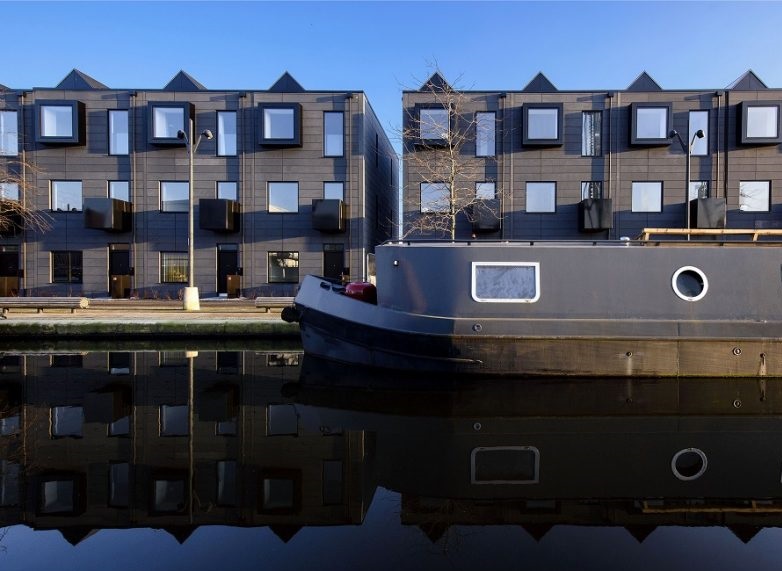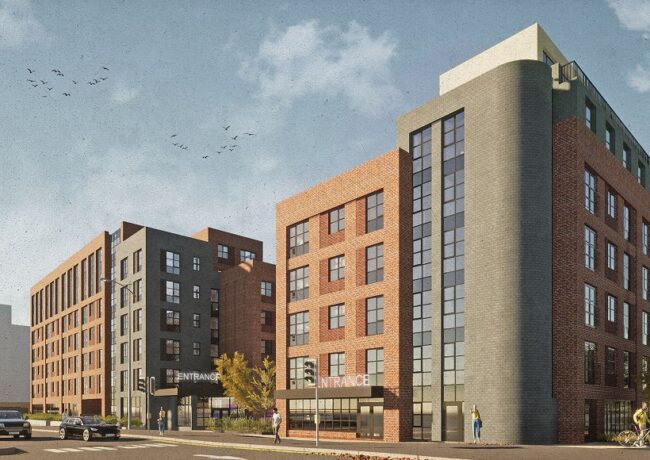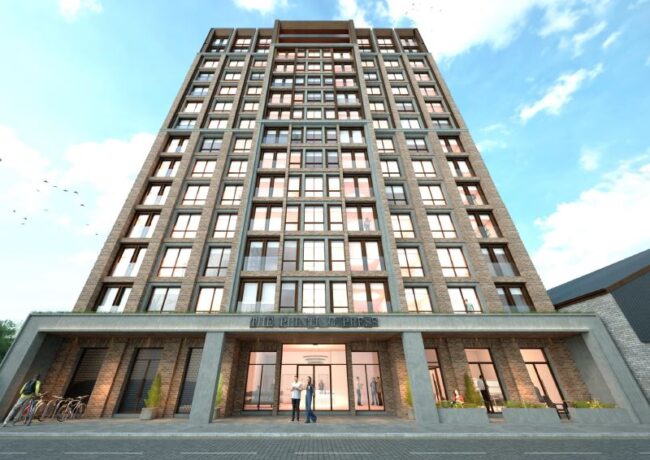Place10: Splash regroups around modular housing ambition
 After surviving the recession thanks to refinancing and joint ventures deals with Pears Group Places for People, Splash is on the charge again, fuelled by an enthusiasm for modular housing. Chairman Tom Bloxham talks to Paul Unger.
After surviving the recession thanks to refinancing and joint ventures deals with Pears Group Places for People, Splash is on the charge again, fuelled by an enthusiasm for modular housing. Chairman Tom Bloxham talks to Paul Unger.
Where would we have found you in mid-2007? At that time, Urban Splash, just like many other people, had been growing very rapidly. We have come from a standing start developer with nothing to doing about £100m of turnover a year, hitting on about 1,000 units that year, residential units, residential flats or certainly over 1,000 production, and we have built up the company net asset value from nothing to £100m net asset and the company, arguably, is worth considerably more than that.
All of a sudden then, we saw the world collapse around us and we had sort of spent some time thinking beforehand what would happen in a recession. What we had not really planned for or anticipated was a total lack of liquidity in the debt markets, a lack of availability of mortgage markets and I suppose what we had planned was that in the event of a further downturn, we had a very simple policy we would start nothing new but finish off everything that we had started and that what we could not sell we would just rent out.
What we did not realise is that mortgages were not available so although virtually everything was pre-sold with three years’ worth of pre-sales done, people could not complete because they could not get the mortgages. What we did not realise was that banks would not only want to lend us no more money but would want the money back and tried to do whatever they could to get what they were owed repaid to help their own liquidity crisis, understandably and the bank and the Government, with the abolition of the RDAs, would actually go back on contracts, which we thought we would never see.
They were sort of crazy times.
All of those things happened and in many ways, Urban Splash were at the epicentre of that crisis in that we were speculative, largely residential, largely outside London and most of the people, sadly, in our space, just disappeared and went bankrupt, like City Lofts.
But, we were very determined to see our way through it and although we had a very tough time and all that value of £100m we lost and we ended up having nothing and a negative balance sheet of nearly -£100m at one point, nothing really changed interestingly, apart from the figures and so the assets we owned, we always owned. The income coming in went down but went down very marginally, like by 5% or 10%. What changed was the valuation and the valuation of the properties went down dramatically and the reason being was largely one of confidence, or lack of confidence, and fear. If you take for example a flat was worth £100,000 and people found £100,000 and the valuers started getting nervous and they down-valued it to £90,000, which was probably not a bad guess and pretty accurate. Because it was worth less than was paid for it and people often had a very high mortgage on it, nobody wanted to sell it for less than £90,000 so everyone just stays put, nothing gets sold. All fine, until you get a forced sale. So, someone has done a runner, and you always get a few people that have not paid their mortgage. The mortgage company eventually come to repossess, typically six months or a year later. By the time they repossess it, the kitchen has been whacked out, anything of value has been whacked out. They think, right, we will sell this at auction so, the thing is worth £90,000, it is going to cost somebody £10,000 to put the kitchen back in, so it is priced at £80,000, someone needs a profit, so £70,000. It goes to auction, sells at £70,000. The problem is, that is the only sale that has happened all year. The next one comes along. Another one gets repossessed. The price now at the Land Registry is £70,000. Same thing happens. Someone has not paid their mortgage because with all the willing sellers no-one is going to say it is worth over £70,000 and there might even be negative equity in this so they cannot afford to sell it even if they wanted to. Only people getting it are forced sellers. Somebody else has not paid their mortgage, done a runner and more than likely you would do that. Another one gets repossessed. There is a kitchen missing so it’s not worth selling at £70,000, £10,000 to put the kitchen in, £60,000, £10,000 profit now it goes on the mortgage as £50,000 so you have had two flats sold out of 200 or whatever it might be and the price has halved. Everyone then starts getting really nervous. Valuers are afraid of being sued. No-one wants to value anything up, no-one is buying new because they are afraid they are on a downward trajectory and that is what we had for a number of years and so it made it a very difficult time for Urban Splash and others.
What did we do about it?
Well we did not pack up and go. We believed fundamentally that things would come good and that the basic property we were doing we were building very well. Interestingly, some flats like in Albert Mill we were doing and completing, were sold all through the recession, almost entirely to cash buyers, because people could not get mortgages. So we had a very simple policy. We had a whole load of half-finished buildings, they are worthless, less than worthless half-built so we have got to get those finished. So, in 2009 we managed to raise another £50m from the HCA and HSBC, we finished whatever we had started. Very simple strategy. What we could sell we would sell. What we could not sell, we would rent. We built up a big rental portfolio of 800 – 900 units.
How was it you were able to survive when others went bankrupt with the same valuations that were hitting them and how did you convince HSBC and HCA right in the depths of it, in 2009, to give you £50m? Part of that was our commitment. They saw we had a very, very straight game, you know we had all the accountant firms looking at us and everyone saw we had a totally straight game with no expenses, no company cars, no aircraft, the only company vehicle was a Ford Escort van, fully depreciated, silly things like football season tickets they looked at which were all paid for as individuals rather than the company so they saw we had a very straight game. Secondly, we believe that it was very, very tough then and for a few years we went out of property development and into debt management in effect and we were definitely working with the banks looking after the assets with them because they had an economic interest in it. I believe in the brand, and I believed that we had something of value at the end of it. We had so much debt and the banks had to work with us and we were the best people to work with them doing it and seeing actually the value of half-built buildings was nothing, who were the best people to finish them off, we were, we knew the buildings, so we persuaded the banks, and they persuaded us so a bit of both, to see the job through and to get it finished and at least once they were finished and let off you have an income-producing asset which again, as time proved, became very valuable.
So to pick up the story after HCA and HSBC in 2009 you worked through the assets? We worked through the assets with them, got everything completed, got everything signed off. We then came to a point, in about 2012, where all the development work was more or less finished and there was actually time to realise it, and we did two things. On the residential side we sold the majority of the residential apartments to Places for People and on the back of that entered a joint venture, not just to manage those residential apartments, in fact there was a PRS firm, but also to start new developments, some on their sites like Smith’s Dock, some on our sites like Park Hill and on some new sites we bid for, like in Birmingham. So out of that recession grew a joint venture with Places for People which we’re now on four sites, bidding for some more sites and developing many hundreds of apartments and houses with them.
With the commercial portfolio, it was a bit more complicated with the banking as we had a very dysfunctional banking syndicate. RBS in their wisdom decided to sell their share of debt to Blackstone, a hedge fund, and they had different timescales to the banks who just stayed with us and worked it through. Blackstone did not want to or were unable to do that so in the end we said the only way to deal with this is to find another partner to sell the assets and so with them we searched for a partner to invest in the assets and that is how we found Pears, which again proved a good partner coming out of the recession.
And how is that structured then in terms of the ownership and the governance? Both of those are 50:50 joint ventures with PFP and Pears. We do management, they are joint investors both in the equity and at least in theory in the debt, although the debt has been repaid now and we do the management but we do everything jointly and that has worked very well. Effectively it is using our development skills, our management skills, using some of the opportunities they bring, some opportunities we bring, some joint opportunities and some of their capital.
And the other 50% is made up of the original Urban Splash directors and shareholders…? Yes, exactly, basically none of the equity was diluted in the end and these are stand-alone joint ventures so some of the staff were dealing with 100%, I mean the only thing that happened was I dissolved some of the shareholding down to key individuals like Nathan Cornish, Simon Gawthorpe and Julian Curnuck who have now got sizeable stakes in the business and also myself and Jonathan [Falkingham, co-founder], but it is all owned by directors.
And in terms of the control now and day-to-day decision-making, is that different from 10 years ago? Probably more cautious. Certainly a lot less geared. A lot of the new stuff we are going to go for is around the house brand, a modular house, which is the business we think is scaleable and repeatable but we are still doing interesting regeneration projects like Brownsfield Mill, now called Avro and we are going to launch that shortly, like Boatshed, the old office village in Salford Quays, like Beehive Mill, the old Sankey’s Soap building we have just bought, like Park Hill in Sheffield, like Lakeshore in Bristol, like Royal William Yard in Plymouth, so still doing those interesting historic refurbs.
And in terms of the approach to get through the recession and rebuilding, was there a plan from the outset or was it more responding to the circumstances and opportunities that came out? It was a bit of both. Inevitably we did not know who the partner was going to be so we had to go out and find those. Inevitably you are depending very much on the banks at the time but there was a deeply-felt view that what Urban Splash were doing was different to many other developers. There was an intrinsic value in the brand that we wanted to keep hold of and with that intrinsic value was a short-term crisis that went on longer than we thought but we still thought it would be a passing crisis and thought we would be able to see through it if we kept working, which came partly from gut instinct and partly from chatting. The first thing I did was to talk to all the people I knew, people like Nick Leslau, people like John Whittaker and they virtually all told me the same story, basically ‘You’ve got a great brand Tom, you have got a great business, keep with it, it will be alright’. It was quite hard to hear at the time because world was crashing around us but it proved to be very prophetic.
And in terms of, what you are alluding to there, the psychological impact of the recession, was it a blow to your confidence or did you remain as bold throughout it? No question it was a blow to your confidence. We had been one of the superstars of the property business and one of the problems is in this great nation of ours, in Britain, we do like to build people up and knock them down and there seemed to be a lot of people quite eager to write about being knocked down and that is quite hard. We had many Monday mornings where we had solicitors in the room advising us whether we were a going concern or not and doing that can sap the energy and it was a very tough time. But, you know we fronted it all, we did not run away, or we did not throw the keys in and we worked at it although we had to reduce, we had to make a lot of redundancies and lose a lot of good people, a lot of people who were friends. The core team stayed remarkably intact and we had a self-belief that we could get through it.
And from a personal point of view, were you ever tempted to hand the keys in, throw the towel in and go and do something else, or retire, for want of a better phrase? Well I was in a very lucky position personally in that I had made some personal wealth outside of business through Baa Bar and various other deals I had done so I had no personal guarantees so I would have been quite able to throw the keys in and do that, so at times I suppose that might have felt attractive not having to deal with all the crap we had to deal with but no, I mean it never really crossed my mind. I always wanted to … you know it was a business I had started from scratch and I wanted to see it through and I wanted to protect the jobs and to protect the brand and I thought we had something quite important here. I was not quite sure how small we would have to get to in order to keep going but I thought we could always keep it going and you now see the phoenix from it and it has actually happened remarkably quickly and we have grown back with the value and the schemes we are doing remarkably quickly. But also, what has been interesting is the constant, you know from the beginning all our schemes have inspired us and working with great architects who we have enjoyed working with and we have been doing good projects.
In terms of the numbers today, what is the valuation and how has the number of staff changed? The staff numbers, we are now back up to 90 people. I mean we have been bigger than that in the past, for example one of the things we did is we thought we would start a chain of boutique hotels, which was probably a very bad idea, or a good idea at the wrong time…The Midland was probably the worst idea, starting in Morecambe, but we had an idea of doing a series of boutique chain hotels, one in Park Hill, one in Plymouth, one in Birmingham and Cincinnati so we had highlighted a series of buildings to do it but again, we had about 100 people working on that and although we let those people go, we basically sold the business of doing hotels so the jobs remained intact but they stopped working for us so there were a number of issues like that where we were focusing on.
And the portfolio, the net asset value? The net asset value of the portfolio, very good question. I mean the commercial is slightly smaller, because we sold buildings like Fort Dunlop, although we are back buying new buildings again now, it is probably two-thirds of the size it was at the peak, and growing. The residential is always moving. It is a work-in-progress. Buying and selling. The residential portfolio has gone down in size but also our debt has gone down in size considerably. In fact, I doubt whether we have got any net debt at the moment other than to shareholders. Probably just about neutral in terms of cash balances and debt so you know, I think at the last count it was £30m cash balance so much less geared, much cash richer and more cautious.

Could prefabricated housing, like Urban Splash’s hoUSe development, become the modern-day ‘dream home’?
Can you explain the move to modular housing? Part of the move to modular came out of the recession. I worried whether we would be able to borrow tens of millions of pounds again to do the big projects. I thought we could build a house for £100,000, sell it, build another one for £100,000 and sell, so it was much less capital-intensive. We started looking at houses first. What I also noticed, particularly in Manchester, was everybody who lived in Urban Splash lived in flats. When they moved, nobody bought new-build houses, they all bought terraced houses in Chorlton or Didsbury or Hale and actually I thought about terraced houses, so you look at that and you realise well actually they are more flexible than modern new-build houses, because they have got more structure to the walls, and they have got big windows, high ceilings, bigger space standards, so although in some ways our modular house is very modern, in other ways it is very traditional and simply is exactly the same plan as the Victorian terraced house.
Why not reinvent the terrace doing the modular and letting people personalise their home like buying a car? Ten years ago when you bought a brand new car you entered the car showroom, drove away with the one that suited you. Today, you go online and specify exactly what you want, what size engine, what colour, the upholstery, convertible, what wheel base and so on so why not with houses? And so it came as a direct result of the recession and the global financial crisis. Then, thinking about how we build houses and we still build houses out in the rain, outdoors, depending on the weather, depending on labour, I mean a bricklayer if he gets £10 a day more he goes off site and works somewhere else.
I believe houses will be the last thing we industrialise and I believe in that process. We have a lot of learning curves, we have a lot of scars on our back, we are getting it right and we are building for quantum and getting the costs down and the quality up and I believe it is the future and we have got a start on the others. We have proved the concept, got the prototype done, the first ones are occupied. We are on site with three live sites, we have another site in planning, we have a few more sites in the pipeline and we will be moving to be building thousands of homes a year and I believe it is a business that actually scales more than any of the previous property businesses that I have been in.
Sites
Well the existing sites are New Islington, where the first phase is all complete and occupied. We are on a site now, Riverside, by the Manchester Arena, the first homes you can see them coming into place. We are on site in Smith’s Dock in the North East where the first houses are completed. We are just in for planning now in Birmingham where we have a site for 1,200 homes, we hope to announce a site in Merseyside shortly and we are bidding for a number of sites across the country and all over the UK.
Manufacturing
We are manufacturing in partnership with a big company called SIG Insulation which is a FTSE £3bn company, potentially we purposely wanted to work with other people who understand better the manufacturing process than we do, we wanted to purposely work with large companies because we want to scale this business and we are interested in expanding a range of products that will do it.
The market
What we have seen in Manchester is great, a whole load of loft buildings and new buildings but they are all appealing to a similar market. They are designed, if I am being slightly cynical about them, for great efficiency, like an accountant’s spreadsheets. They are trying to get as many apartments as they can in the building, which means they have long corridors, single-aspect apartments, offering sunlight, and typically they are 400 sq ft to 500 sq ft for one bedroom, 600 sq ft to 700 sq ft for a two-bedroom. What I believe, and sort of against the advice of most of the agents, is a new breed of people, slightly older, perhaps living in the city centre for some time who want to get a bigger place and perhaps want to buy their last place to live, as well as their first place, in the city centre and so maybe it is 1,000 sq ft, maybe it is 2,000 sq ft, maybe even 5,000 sq ft. Maybe they are thinking rather than go to buy a £3m house in Carrwood [Hale Barns] or Alderley Edge, why not move into the city centre where you can have all the benefits of the city centre and so we are developing much bigger lofts. Although we have had a few big lofts, like at the top of the Beetham Tower, it tends to be one big one alongside a load of small ones and not everyone wants to live with a load of people below them so it is trying to get a community of like-minded people together to live there.
What we are doing with housing units is bringing families in there. For years I was knocking on the door of the Education Office and the Education Officer actually said families were moving out and the reason they were moving out was that as soon as they had kids they moved out and it was because of primary schools. We opened New Islington Free School in 2015, surprise, surprise it is full. It is Ofsted “outstanding”. They have now doubled the size of it in the second form entry, it has been fantastic, there are loads of kids around there and it is fantastic to see and hear and having young kids in the city centre is calming. It is great to have young professionals in the city centre but you want to have a whole variety of different people and different size apartments to attract all sorts of people.
Forecast
I think Manchester has only seen the beginning of its re-urbanisation. The only worry I have got is that I do believe there are a lot of very similar type of properties coming on the market – relatively small flats, single aspect in big buildings, all appealing to the top 10% by money of the renters. I think that is slightly worrying. What is going to happen? It won’t be a debt crisis because most of these have been funded through equity and so if at the end of the day, they are all appraising it at £400/sq ft to £500/sq ft, and I really hope they are right because it is great for all of our businesses if they are, they are slightly higher than what we are selling or appraising our properties, and at the very top 10% of the rental market usually. If they are all like that, that’s great, if they are not, actually I do not think it really matters because if they get it slightly wrong they are not going to be forced sellers, they will just sit on it and ride it through and the market will catch up with it after a bit of time as we saw in the last recession.




